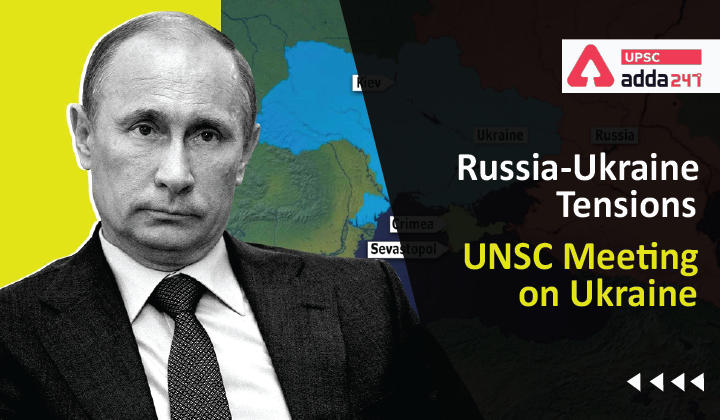Table of Contents
UNSC Meeting on Russia- Ukraine Tension- Relevance for UPSC Exam
- GS Paper 2: International Relations- Effect of policies and politics of developed and developing countries on India’s interests.

UNSC Meeting on Russia- Ukraine Tension- Context
- India called for quiet diplomacy and the peaceful resolution of the Russia-Ukraine tensions at the United Nations Security Council (UNSC) meeting on Ukraine.
- India also called for the immediate de-escalation of the Russia-Ukraine situation while taking into account the security interests of all.
UNSC Pledges to Stop Nuclear Proliferation
UNSC Meeting on Russia- Ukraine Tension- Key Points
- India’s Stand: India was one of three countries (Kenya and Gabon were the others) that abstained from a procedural vote on whether or not Ukraine would be discussed.
- India reiterated its support for a July 2020 ceasefire, the 2014 Minsk Agreement and the Normandy Process.
- The Normandy Format refers to discussions held between Russia, Ukraine, Germany, and France, who have met since 2014, when Russia annexed Crimea.
- China’s Stand: China and Russia voted against the move to discuss the Russia-Ukraine issue in the UN Security Council (UNSC).
- USA’s Stand: The U.S., which initiated the meeting and nine other countries voted to hold the discussion on the Russia-Ukraine issue in the UNSC Meeting.
United Nations Security Council (UNSC): Key Points about UNSC
- UNSC is one of the six main organs of the UN. Article 23 of the UN Charter concerns the composition of the UNSC.
- The other 5 organs of the United Nations are—the General Assembly, the Trusteeship Council, the Economic and Social Council, the International Court of Justice, and the Secretariat.
- It’s primarily responsible for maintaining international peace and security. Under UN Charter, it’s obligatory for the member states to implement decisions of the UNSC.
- Main headquarter: New York City at the UN Headquarters.
- Composition: It is composed of 15 members- 5 permanent and 10 non-permanent.
- Permanent members: China, France, the Russian Federation, the United Kingdom, and the United States.
- Non-permanent members: Each year, the General Assembly elects five non-permanent members out of a total of 10, for a two-year term.
- Process of the election of non-permanent members:
- Regional distribution of seats: Five for African and Asian countries; two for Latin American and Caribbean countries; two for Western European and other countries; one for Eastern European countries.
- Out of five, three are allocated for Africa and two for Asia.
- A contesting country needs to secure the votes of two-thirds of the members present and voting at the General Assembly session (a minimum of 129 votes if all 193 member states participate).
- A contesting country has to obtain this irrespective of whether it has been endorsed unanimously by its group or not.
- For example, India’s candidature for the 2021-22 term was endorsed unanimously by the Asia Pacific group. Still, India had to secure a minimum number of votes in the General Assembly session. It garnered 184 votes in the General Assembly.
- Decision-making at UNSC: Each member has one vote. For any resolution to pass, 9 members out of 15 should vote in favour including the concurring votes of the permanent members.
- The veto power of Permanent members: A “No” vote from one of the five permanent members blocks the passage of the resolution.
- A non-member of the security council can participate in UNSC discussions but without a vote, if it is discussing a matter which directly affects the interests of the concerned country.
- UNSC Presidency: rotates every month among its 15 members.
- Enforcement of UNSC decisions: they are typically enforced by UN peacekeepers, military forces voluntarily provided by member states, and funded independently of the main UN budget.
- Regional distribution of seats: Five for African and Asian countries; two for Latin American and Caribbean countries; two for Western European and other countries; one for Eastern European countries.
United Nations Security Council: Composition, Functioning and Indian Engagement at UNSC
United Nations Security Council: Composition, Functioning and Indian Engagement at UNSC



 TSPSC Group 1 Question Paper 2024, Downl...
TSPSC Group 1 Question Paper 2024, Downl...
 TSPSC Group 1 Answer key 2024 Out, Downl...
TSPSC Group 1 Answer key 2024 Out, Downl...
 UPSC Prelims 2024 Question Paper, Downlo...
UPSC Prelims 2024 Question Paper, Downlo...
